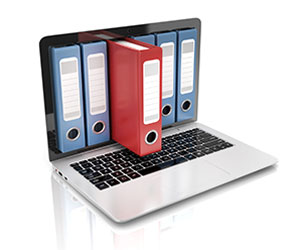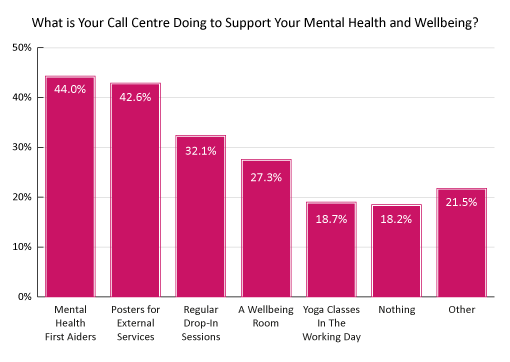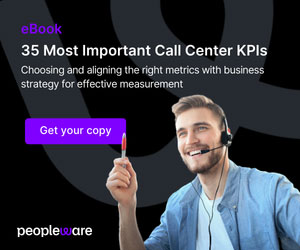Joe Henderson, Head of Learning and Development for the Retail and Commercial businesses at Wessex Water, shares the ins and outs of what it takes to win a ‘Mental Health in the Workplace’ award at the South West Contact Centre Awards – for the third year running!
Here are 10 of Joe’s top tips to help you better support your agents’ mental health and wellbeing:
1. Put Clear Boundaries in Place for Mental Health First Aiders
There’s a lot of Mental Health First Aider training that’s quite broad and not workplace specific. Whilst it’s great for colleagues to take part in the training, the challenge comes in setting boundaries everyone is comfortable with in the workplace.
That’s why it’s so important to recognize and discuss the purpose of Mental Health First Aid, as it’s exactly that!
It’s First Aid, not ongoing emotional support, which could be very dangerous for your colleagues to offer, as they’re not trained counsellors.
It’s best to have a defined remit on commitments for Mental Health First Aiders and their responsibilities – for everyone’s sake.
2. Reduce Stigma Around Mental Health
Why not record videos of people across your organization sharing their story and some of the challenges they’ve faced over their life?
This is especially powerful if it comes from those in more senior positions, as it helps to show that mental health problems don’t have to hold you back in your career or create a lasting perception of being weak or having a reduced capability for work.
The efforts pay dividends, as when this comes to life and you see people of all different positions being open and honest, it breaks down the stigma – all helping to make the message more relatable.
Reducing the stigma around other health conditions such as the menopause is also important. To find out more, read our article: Don’t Let the Menopause Compromise Staff Retention in Your Contact Centre
3. Host Regular Review Meetings to Spot Opportunities and Inefficiencies
To maintain momentum with wellbeing initiatives in your contact centre, it helps to have regular meetings with your Mental Health First Aiders and other volunteers.
In these meetings you can talk about key events coming up on the mental health calendar and get on the front foot with making collective plans for recognizing those days – such as bringing in guest speakers, reviewing company policies, and so on.
It can also be an opportunity to talk about what’s going on in society – for example, supporting people through the cost-of-living crisis – as well as a chance to discuss what’s not working and why for continuous improvement purposes.
4. Track What People Are Reaching Out About
It really helps to have a basic tracker in place to monitor how many people reach out to your Mental Health First Aiders.

Whilst no personal data, names, or details of the conversations, are needed, it should just capture broadly when the person reached out and what it was in relation to (e.g. a bereavement, anxiety, etc.…), as this really helps to build a picture of how the services are being used.
By doing this at a very high level, you can then look out for potential trends and issues to address or focus on.
It can also help with a business case for needing to train more Mental Health First Aiders if the current team are in high demand.
Beyond this, it also helps to justify the time and commitment to upper management, by being able to say “we’re helping X amount of people”.
This is particularly useful, as it can be very difficult to measure exactly what impact you’re having with your wellbeing programme.
Don’t forget agents can also suffer from vicarious trauma. For more information on this, read our article: Introduction to… Vicarious Trauma in the Contact Centre
5. It’s Not About Being Positive 24/7
Don’t feel the need to put on a positive show all the time.
It’s tough for a lot of people right now, and if you acknowledge that and explore some of the issues people are facing, then that builds the trust that “it’s OK not to be OK”.
It’s far more powerful to delve into some of that and share awareness than to happily pretend eating more fruit and vegetables will magically fix everything.
6. It’s a Good Thing if Mental Health Reasons for Sickness Go Up
You may find, as we did, that mental health reasons for sickness go up after you launch your wellbeing programme.

However, don’t be alarmed and feel like you’ve made things worse.
This signals that the people who previously came back into work and said, “sorry I had food poisoning” actually felt that they could come back into work and say a more honest “I was struggling with my anxiety”.
This means the company is getting more accurate data as to why people were off, perhaps because they felt like they couldn’t be honest about it before. It’s a good thing in the long run!
7. Don’t Set Unfair Expectations on Your Volunteers or Employees
Be very clear that it is not the responsibility of the Mental Health First Aiders to go out and spot every person with an underlying mental health issue, as people can be very good at hiding things.
Likewise, you can’t say “you are now obligated to talk to us if you’re going through personal issues” to every employee on the first day of having Mental Health First Aiders in post.
It all takes time and it’s about creating a supportive environment, so that when people do feel ready, they can talk.
It all takes time and it’s about creating a supportive environment, so that when people do feel ready, they can talk.
8. Wellbeing Support Should Become Part of Your Operating Rhythm
The overall goal should be for mental health and wellbeing support to become part of your operating rhythm – not a one-off or sporadic focus.
For example, having enough Mental Health First Aiders in post to avoid too much strain on any one person, running quarterly meetings to progress wellbeing initiatives, scheduling annual refresher training, ring-fencing time for wellbeing projects as a business priority, and more.
9. Celebrate Awareness Days With Engaging Activities

There are a lot of mental health awareness days scattered through the year – like ‘time to talk’ day and ‘mental health awareness week’.
It’s very tempting to stick a PDF document out with some facts on an email and tick it off the list, but these ideas really need to be backed up by investment – of both time and budget.
You also need to think about more engaging ways to showcase these awareness days. For example, on ‘time to talk’ day, you could get your team out of the building to talk about how they are feeling to show a stronger commitment to the cause.
10. Don’t Bury Your Head in the Sand and Do Nothing
Just make sure you aren’t ‘one of those’ contact centres doing nothing!
As, according to Call Centre Helper’s What Contact Centres Are Doing Right Now (2023 Edition), a shocking 18.2% of survey respondents claimed that their contact centre was doing ‘nothing’ to support their mental health and wellbeing.

Worried this sounds like you? Don’t panic! As the Chinese proverb goes ‘A journey of a thousand miles begins with a single step’. Good luck!
If you are looking for more information on employee wellbeing, read these articles next:
- How to Better Support Men’s Mental Health in the Contact Centre
- A Guide to Improving Mental Health In the Contact Centre
- Top Tips to Spring-Clean Your Team’s Wellbeing
- Employee Well-Being: How to Reduce Contact Centre Stress
Author: Guest Author
Reviewed by: Megan Jones
Published On: 11th Oct 2023 - Last modified: 31st Oct 2023
Read more about - Call Centre Management, Culture, Editor's Picks, Employee Engagement, Health, Well Being




































